news
Months after the crash of the Ooni’s marriage, another wife steps in
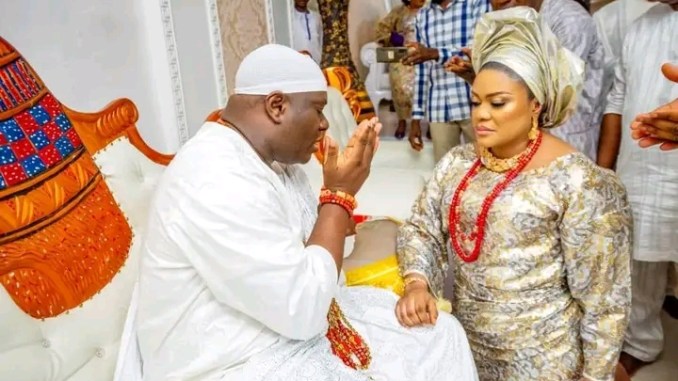
 …..Ooni’s new wife arrives palace
…..Ooni’s new wife arrives palace
Mariam Anako, the new wife of Ooni of Ife, Oba Adeyeye Ogunwusi, late on Tuesday arrived at the palace of the monarch in Ile-Ife, Osun State.
The new wife was ushered into the palace after brief rites at the entrance to the premises.
She was thereafter led into the inner court of the palace to meet her husband and other guests waiting to receive her.
Oba Ogunwusi in a video shared on the Facebook page of his spokesperson, Moses Olafare, around 10:30 pm on Tuesday, was assisted by chiefs and close aides, in welcoming the new wife into the palace.
Also, Ooni elder brother, Sooko Adegboyega Ogunwusi, and the monarch’s other siblings were also mentioned by the compere at the ceremony as being present.
During the ceremony, Anako’s relations from Ebiraland in Kogi State and Ilorin in Kwara State were also present and they took turn to greet Ooni.
The new wife was coming into the palace about 10 months after Naomi Silekunola, the last wife of the monarch left him.
Specifically, Naomi announced separation with the monarch on Thursday, December 23, 2021, thus ended a marriage that produced a son, Tadenikawo, and lasted about 3 years.
Ooni’s spokesperson, Moses Olafare, could not be reached for further comment on Wednesday as calls to his line rang out.
Our correspondence reports that Naomi announced her separation from the monarch through an Instagram post in December 2021.
She had also renounced the title of a ‘Queen’, saying she tried to make the three-year union work but the Ooni’s public identity is at variance with “his true self”.
After the split between 47-year-old Ooni and Naomi, many Yoruba monarchs and elders including the Deji of Akure, Oba Aladetoyinbo Aladelusi, tried to reconcile the estranged couple but the peace talks did not yield results.
Before being coronated king, the Ooni was previously married to Adebukola Bombata in 2008 but the marriage failed. As a monarch, the Ooni married Edo-born Zaynab-Otiti Obanor in 2016 but the union lasted for 17 months before their separation.
He later married Silekunola in 2018 and the marriage produced a son before the divorce announcement in December.
The monarch also had a daughter with Omolara Olatubosun as a teenager. Olatubosun gave birth to Princess Adeola Ogunwusi but recently, there have been counter-claims between the Ooni and Olatubosun over who was responsible for the upbringing of their daughter.
Aside from the Ooni, other traditional rulers who had experienced divorce known to the public include the Oluwo of Iwoland, Oba Abdulrosheed Akanbi, whose marriage to his Jamaican wife, Ms Chanel Chin, crashed in December 2019. Also, Anuoluwapo Adeyemi, one of the wives of the late Alaafin of Oyo, Lamidi Adeyemi III, parted ways with him in November 2020.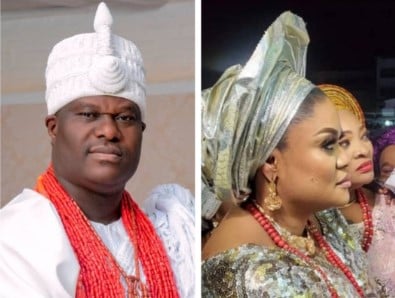
news
Oyetola Leads Nigeria’s Strategic Bid for IMO Council Seat, Aiming for Global Maritime Influence
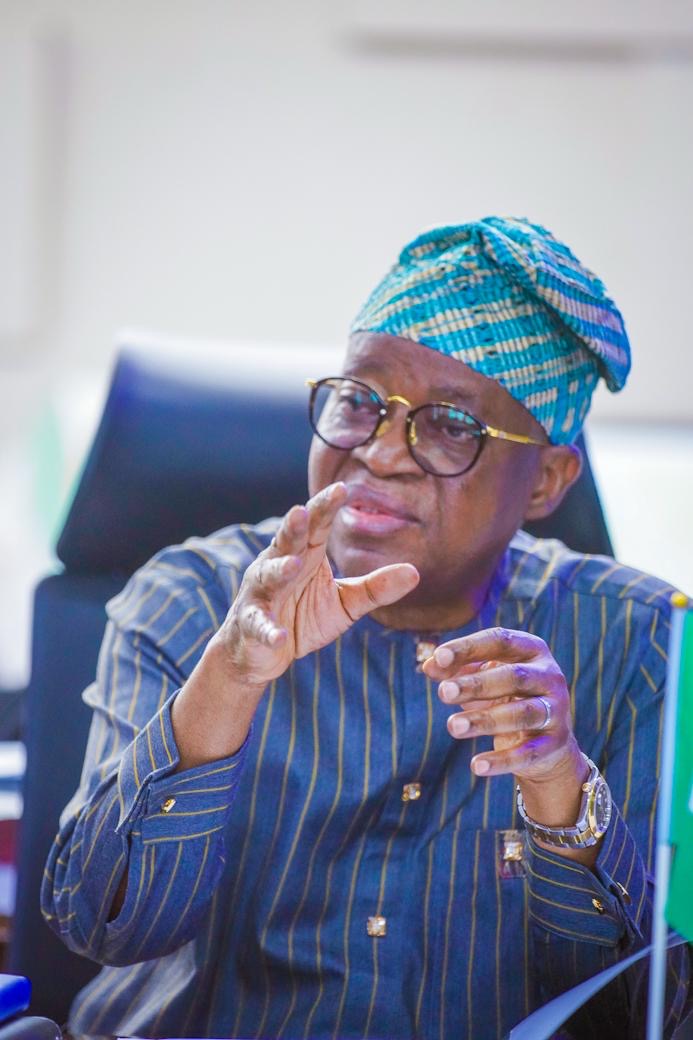
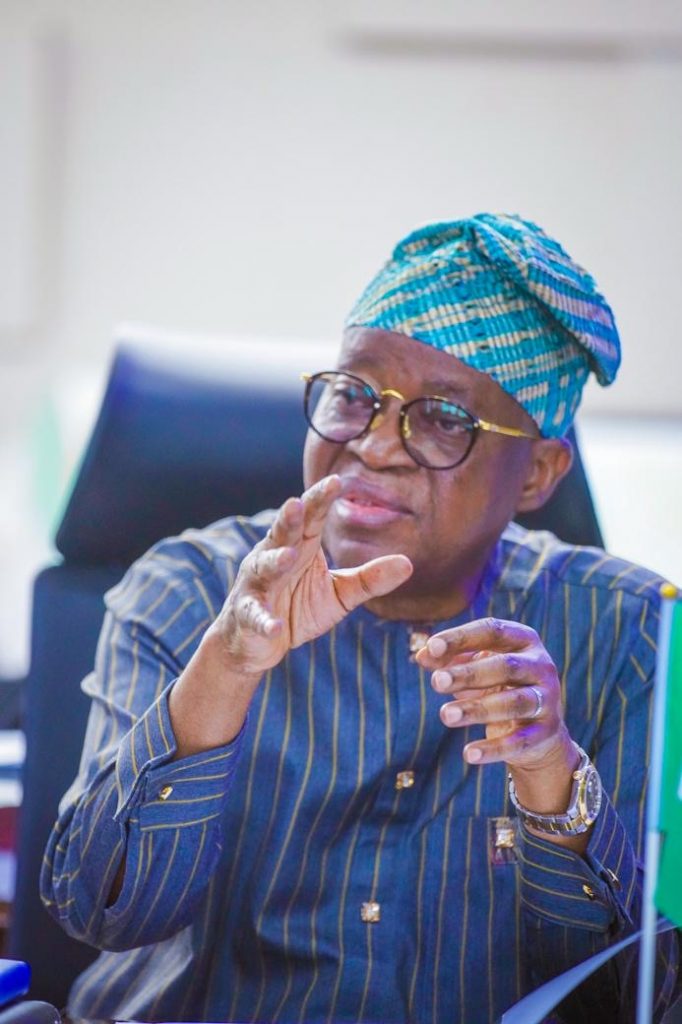 Nigeria is setting sail towards a greater role in international maritime affairs as it bids for election into Category C of the International Maritime Organization (IMO) Council.
Nigeria is setting sail towards a greater role in international maritime affairs as it bids for election into Category C of the International Maritime Organization (IMO) Council.
Leading this ambitious push is the Honourable Minister of Marine and Blue Economy, His Excellency Adegboyega Oyetola (CON), whose vision is to position Nigeria as a dominant force in global shipping and maritime governance.
The IMO, a specialized United Nations agency responsible for regulating international shipping, holds its Council elections later this year. Category C is specifically reserved for nations with significant interests in maritime transport and trade, providing them with a platform to contribute to shaping global maritime policies. For Nigeria, securing a seat is not just a diplomatic pursuit it represents a strategic leap forward for economic growth, regional leadership, and maritime security.
At the heart of this campaign is Nigeria’s intention to amplify its voice in international maritime decisions. Membership in the IMO Council would afford the country a pivotal role in the formulation of regulations and policies that affect shipping, safety, environmental protection, and trade. This influence would allow Nigeria to safeguard both its national interests and those of the broader West African sub region.
Economic prospects tied to the blue economy form another cornerstone of Nigeria’s bid. With a coastline stretching over 850 kilometers and a maritime domain rich in resources, Nigeria is aggressively advancing its blue economy agenda. A seat at the IMO table is expected to draw foreign investment, stimulate port infrastructure development, and enhance trade efficiency all in line with President Bola Tinubu’s broader strategy for economic diversification.
Maritime security is also high on the agenda. Nigeria, which has made considerable strides in curbing piracy in the Gulf of Guinea, sees IMO Council membership as a means of deepening international collaboration, adopting global best practices, and enhancing safety standards along its waterways.
The campaign also underscores Nigeria’s commitment to human capital development. By aligning more closely with the IMO, Nigeria aims to provide its maritime professionals especially young people with increased access to global training programs and capacity building initiatives. This would help nurture a new generation of skilled seafarers, engineers, and administrators capable of competing on the world stage.
Nigeria’s regional leadership is also in focus. As Africa’s largest economy, the country seeks to use its potential IMO seat to drive greater cooperation among African maritime nations, promote sustainable development, and project a unified continental voice in international maritime diplomacy.
In addition, Nigeria anticipates increased access to technical support and maritime innovation through IMO engagement. This includes advancements in shipping technology, logistics modernization, and enhanced port management critical components for a thriving maritime industry.
Oyetola’s Vision and Commitment
Oyetola, since his appointment, has consistently emphasized the need for Nigeria to embrace its maritime identity and assert its global relevance. His advocacy for Category C membership has been described by stakeholders as a bold and necessary step in unlocking the full potential of the sector.
“Nigeria must take its rightful place on the global maritime stage. Our waters, our people, and our potential deserve nothing less,” Oyetola affirmed during a recent stakeholders’ engagement on the bid.
As the IMO elections approach, there is growing optimism that Nigeria’s strategic location, extensive maritime assets, and clear policy direction will earn it a seat at one of the most influential tables in global shipping. The journey to Category C may be competitive, but with strong leadership at the helm, Nigeria is navigating with purpose and promise.
Jamiu Omookose
news
Update : FG confirms continuation of crude, refined product sales in Naira initiative, Says Wale Edu

 The Federal Government has confirmed the crude and refined product sales in Naira initiative remains a standing national policy and will continue indefinitely.
The Federal Government has confirmed the crude and refined product sales in Naira initiative remains a standing national policy and will continue indefinitely.
However, the policy will stay in place as long as it serves the public interest and supports Nigeria’s broader economic goals.
This assurance was contained in the official X (formerly Twitter) handle of the Federal Ministry of Finance on Wednesday morning amid growing inquiries on the status of the policy.
The Ministry stated the initiative, first approved by the Federal Executive Council (FEC), is a long-term strategic directive and not a short-term or provisional measure.
According to the Ministry, stakeholders have reconvened to reiterate their full support and ongoing commitment to ensuring the successful implementation of the initiative.
The policy, which mandates the transaction of crude oil and refined petroleum products in Naira, is aimed at strengthening the country’s economic sovereignty, enhancing local refining capacity, and stabilizing the foreign exchange market by reducing the demand for dollars in domestic petroleum transactions.
The Ministry explained that this policy is structured to foster energy security and encourage investment in domestic refining infrastructure.
“The Crude and Refined Product Sales in Naira initiative is not a temporary or time-bound intervention, but a key policy directive designed to support sustainable local refining, bolster energy security, and reduce reliance on foreign exchange in the domestic petroleum market,” the statement reads.
While acknowledging that the transition involves complexities, the government admitted that existing challenges are being systematically addressed.
“As with any major policy shift, the Committee acknowledges that implementation challenges may arise from time to time. However, such issues are being actively addressed through coordinated efforts among all parties,” the Ministry said.
To assess the progress made and address lingering implementation issues, the Technical Sub-Committee on the Crude and Refined Product Sales in Naira initiative held a review meeting on Tuesday. The gathering brought together key figures involved in the execution of the policy.
Among the attendees were the Minister of Finance and Coordinating Minister of the Economy, Mr. Wale Edun, who chairs the Implementation Committee; and the Executive Chairman of the Federal Inland Revenue Service (FIRS), Mr. Zacch Adedeji, who heads the Technical Sub-Committee.
Also present were the Chief Financial Officer of NNPC Limited, Mr. Dapo Segun; the Coordinator of NNPC Refineries; Management of NNPC Trading; representatives from the Dangote Petroleum Refinery and Petrochemicals; and senior officials from the Nigerian Upstream Petroleum Regulatory Commission (NUPRC), the Nigerian Midstream and Downstream Petroleum Regulatory Authority (NMDPRA), the Central Bank of Nigeria (CBN), and the Nigerian Ports Authority (NPA). A representative from Afreximbank and the Secretary of the Committee, Hauwa Ibrahim, also attended.
This policy, which aligns with the government’s broader economic reform agenda, is expected to support local content development, ease pressure on Nigeria’s foreign reserves, and provide a more predictable pricing structure for refined petroleum products in the domestic market.
The presence of major players from both the public and private sectors at the meeting shows the scale of collaboration required to sustain the policy. It also reflects the growing confidence in Nigeria’s shift toward economic policies that prioritize local capacity and currency resilience.
news
Breaking : TInubu appoints Bashir Ojulari as new CEO group of NNPC and GMD mele kyari get sacked, Says Onanuga
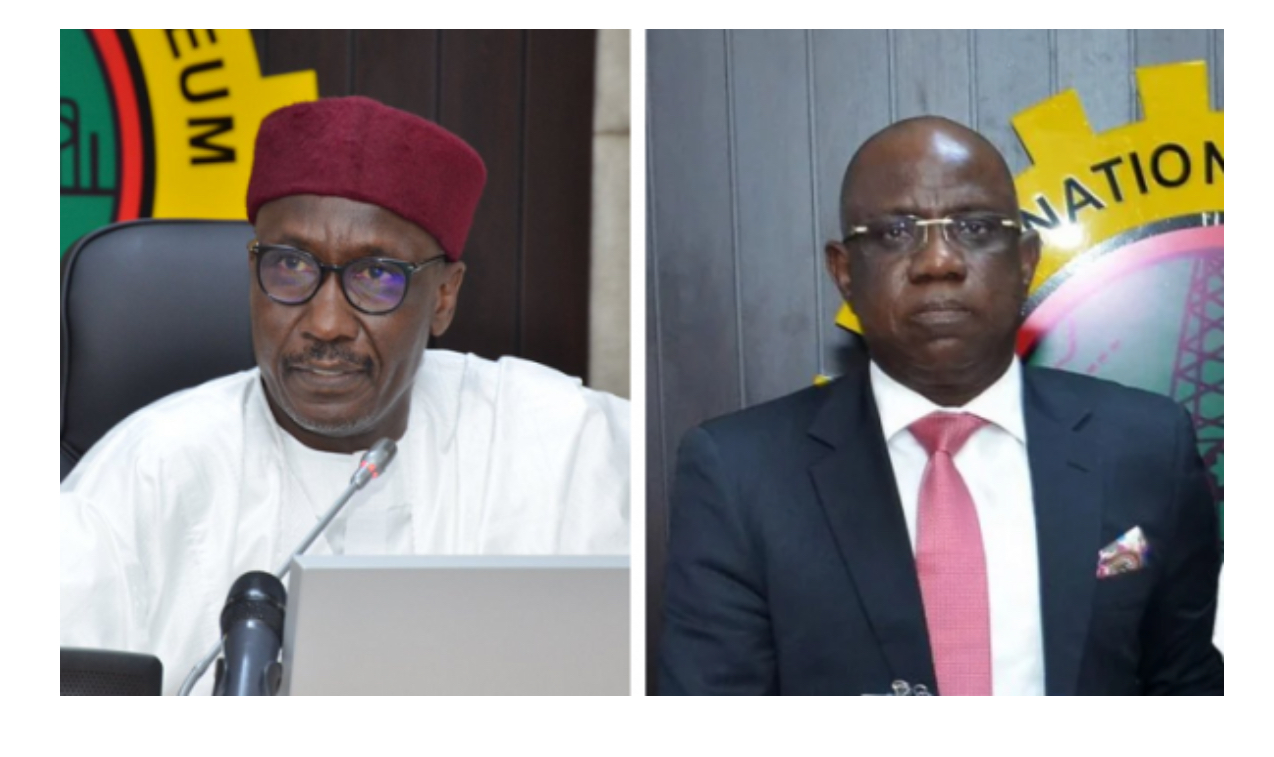
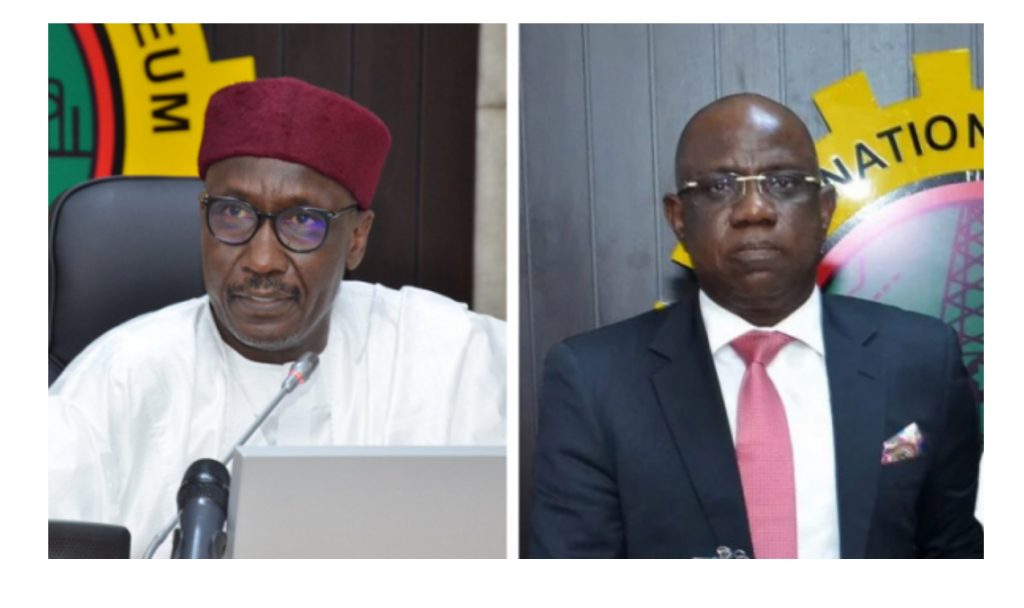 President Bola Tinubu has sacked the board of the Nigerian National Petroleum Company (NNPC) including its Group Chief Executive Officer, Mele Kyari and board chairman Pius Akinyelure.
President Bola Tinubu has sacked the board of the Nigerian National Petroleum Company (NNPC) including its Group Chief Executive Officer, Mele Kyari and board chairman Pius Akinyelure.
The decision, effective April 2, 2025, was announced in a statement by presidential spokesperson Bayo Onanuga.
President Tinubu cited the need for enhanced operational efficiency, restored investor confidence, and a more commercially viable NNPC as the driving forces behind the decision.
Invoking his powers under Section 59(2) of the Petroleum Industry Act (PIA) 2021, he reconstituted the board with new leadership aimed at repositioning NNPC Limited for greater productivity and alignment with global best practices.
Kyari was first appointed NNPC chief by former President Muhammadu Buhari but was reappointed in 2023 by President Tinubu.
As part of the overhaul, Bayo Ojulari takes over from Kyari as the new group CEO, while Ahmadu Musa Kida has been appointed as NNPC’s new non-executive chairman, replacing Pius Akinyelure. Also, Adedapo Segun has been confirmed as the company’s chief financial officer (CFO).
In line with the PIA, the president also appointed six non-executive directors from each geopolitical zone.
They include Bello Rabiu representing the north-west, Yusuf Usman from the north-east, and Babs Omotowa, a former managing director of the Nigerian Liquefied Natural Gas (NLNG), for the north-central.
Others are Austin Avuru for the south-south, David Ige for the south-west, and Henry Obih for the south-east.
Meanwhile, Lydia Shehu Jafiya, the permanent secretary of the federal ministry of finance, and Aminu Said Ahmed of the ministry of petroleum resources will represent their respective ministries on the new board.
“This restructuring is aimed at repositioning NNPC Limited for greater productivity and efficiency in line with global best practices. We are taking bold steps to transform the company into a more commercially driven and transparent entity,” the statement reads.
The changes take effect immediately, and the new board has been handed a strategic action plan, which includes a “review of NNPC-operated and Joint Venture Assets to ensure alignment with value maximisation objectives”.
-

 news4 years ago
news4 years agoUPDATE: #ENDSARS: CCTV footage of Lekki shootings intact – Says Sanwo – Olu
-

 news1 year ago
news1 year agoEnvironmental Pollutions : OGONI COMMUNITY CRIES OUT, THREATENS TO SHUT DOWN FIRSTBANK,SHELL OIL COMPANY OPERATIONS FOR NOT PAYING COURT AWARD
-
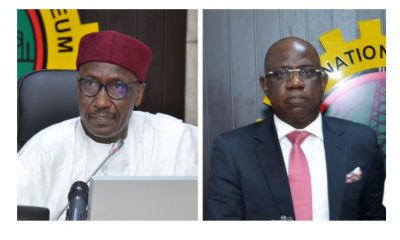
 news2 weeks ago
news2 weeks agoBreaking : TInubu appoints Bashir Ojulari as new CEO group of NNPC and GMD mele kyari get sacked, Says Onanuga
-
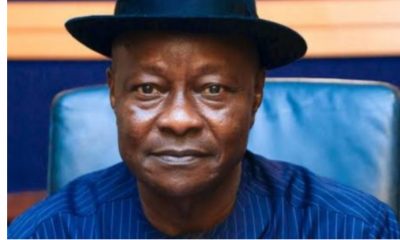
 news2 weeks ago
news2 weeks agoUpdate : Fubara ordered bombing of Rivers Assembly, I am not under duress I resigned, Says ex-Rivers HoS Nwaeke
-
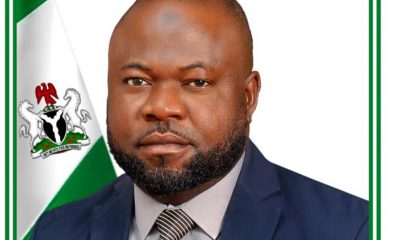
 interview2 weeks ago
interview2 weeks agoNIGERIA MECHANIZED AGRO EXTENSION SERVICE PROJECT, A STRATEGIC MOVE TO ALLEVIATE POVERTY – DR. AMINU ABDULKADIR
-

 news2 weeks ago
news2 weeks agoTinubu commended Nandap for her leadership, extends Comptroller-General tenure till 2026, says Onanuga
-

 brand2 weeks ago
brand2 weeks agoGTCO Plc Releases 2024 Full Year Audited Results …Pays Shareholders Record Dividend of N8.03k for 2024 Financial Year
-
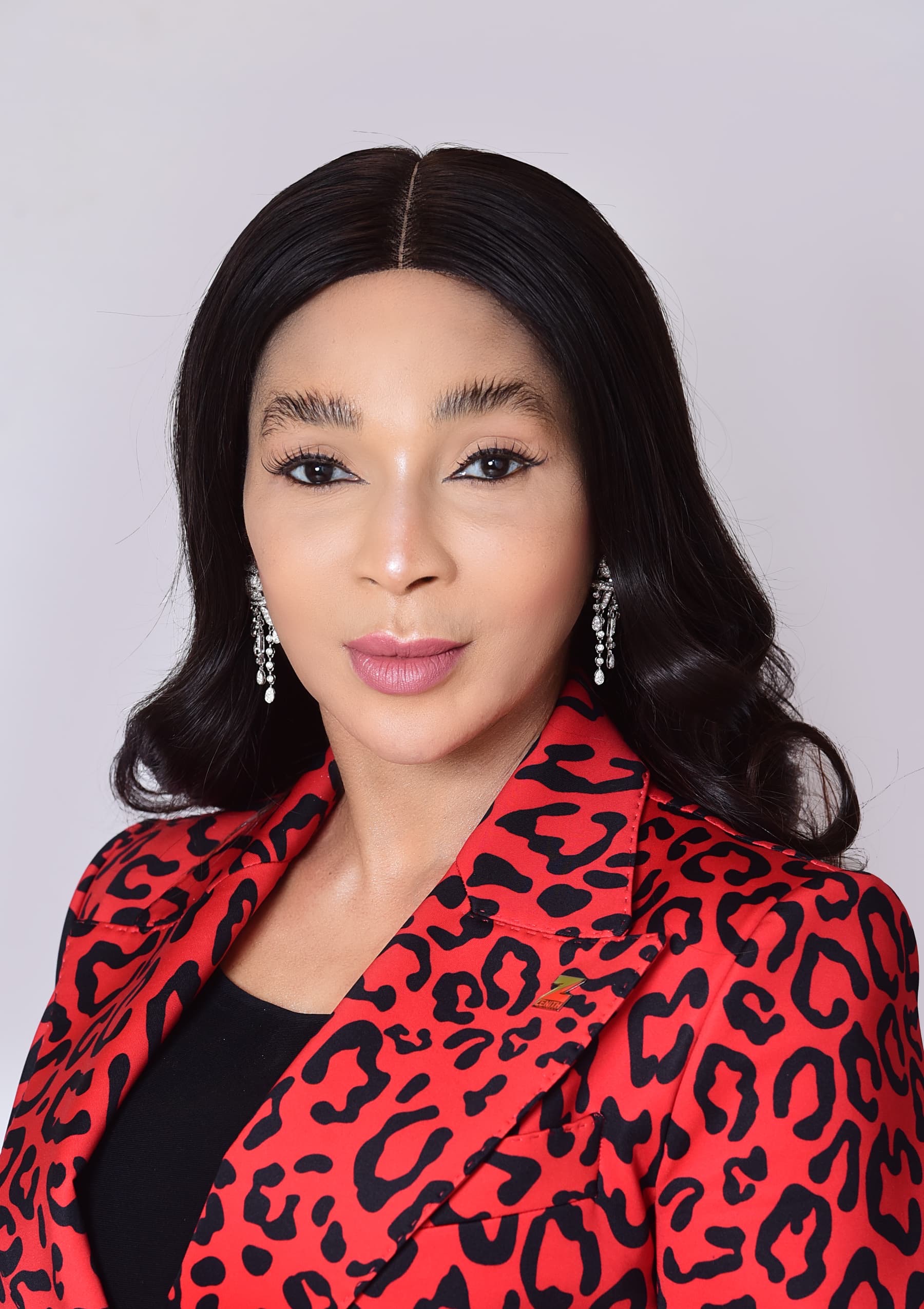
 brand2 weeks ago
brand2 weeks agoZENITHz BANK MAINTAINS SUPERLATIVE PERFORMANCE WITH PBT OF N1.3 TRILLION IN FULL YEAR 2024


